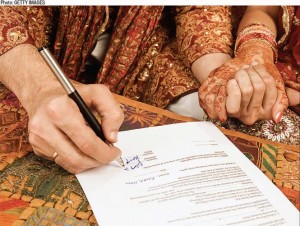In this blog post, Abhiraj Thakur, a student NALSAR University of Law, writes about the registration of marriages under the Hindu personal law and stresses on the various issues that surround it. He further tries to inquire into the feasibility of having a law to enforce compulsory registration of marriages?
“Though destitute of virtue, or seeking pleasure (elsewhere), or devoid of good qualities, (yet) a husband must constantly be worshipped as a god by a faithful wife.”
–Manusmriti V 152
The aforementioned shloka describes one of the many duties of a Hindu wife. The bond or union she shares with her husband cannot be broken as per the Shastri law and so she should continue with her duties even in unfavorable circumstances.
Marriage in Hindu law acts as a fundamental canon of social organization, being a sacrament or a sanskara it holds an exigent and imperative character.[1] It lays out legal and spiritual obligations on two individuals entering a sacred union through performing certain rituals enunciated in the Dharmashastras to pursue Dharma, Artha, and Kama.[2] A Hindu marriage is deemed to be solemnized by the performance of customary rites and ceremonies of the parties, along with Saptapadi and various other rituals. It is considered as a union that cannot be dissolved. But often due to some circumstances the bitterness gets into the marital relationships and the emotional attachment starts disintegrating finally leading to a situation where the parties file either for divorce or judicial separation.
India and legal framework on registration
India on 30th July 1980 became a signatory to the Convention on the Elimination of All Forms of Discrimination Against Women (in short ‘CEDAW’) that was adopted in 1979 by the United Nations General Assembly.[3] CEDAW was ratified by India on 9th July 1993 by two declaratory statements and reservation. Article 16(2) of the CEDAW recommended the signatory nations to adopt compulsory registration of marriages, though India in its declaratory statement appraised:
”It is not practical in a vast country like India with its variety of customs, religions and level of literacy’ and has expressed reservation to this very clause to make registration of marriage compulsory”.
After that, no specific steps proceeded in this direction.[4]
On the registration of marriages in personal laws of other religions, legislations are already in place. For Christians it is the Indian Christian Marriage Act of 1872, similarly, for the Parsis, it is The Parsi Marriage and Divorce Act of 1936 that make registration of marriages compulsory. Muslim marriages are contractual in nature. The Nikah Nama serves as a valid proof of a Muslim marriage. On the other hand, for Hindus, Section 8 of the Hindu Marriage Act talks about registration. It makes it recommendatory for states to have laws for registration of marriage also stating that the failure to register will in no way impact the validity of the same.
Legislative Initiative
In 2005, the National Commission for Women proposed The Compulsory Registration of Marriages Bill 2005; the bill contained a provision for compulsory registration of all marriages in the country within the 30 days of solemnization of the same. The statement of object and reasons in the Bill stated that compulsory registration of marriages in the country will help in dealing with many serious social and legal problems in the country. It will be helpful in preventing child marriages and would ensure that the minimum age of marriage is complied with. Also such a law will prevent non-consensual marriages in the country, will check illegal marriage/polygamy and among other things, would enable married women to claim their right to live in the matrimonial home, claim maintenance etc. and therefore will be a step in direction of empowerment of women.
Issue 1: Can such a compulsion help the cause?
Studies, however, show that there are larger stumbling blocks than non-compulsory registration in claiming maintenance. Under section 125 Cr.P.C, for example, the lack of proof of husband’s income and non-compliance with the maintenance order often leads to stalling of cases.[5] To present registration as a solution to legal hurdles faced by women is nothing but simplification of grave structural inequalities that exists between man and women in the legal arena. There are other better methods to advance the empowerment of women such as, a harmonious and expansive interpretation of the term ‘wife’ under the Indian laws. Shifting the evidence of marriage from registration to long-term cohabitation can, in fact, become helpful for a large number of women across country who cohabit men without officially being married to them, the case of concubines. Such women often face the difficulty in obtaining legal remedies. Also, it is to be noted that there is no specific research behind the proposition that registration can be a viable solution to various socio-legal problems in the country.
Issue 2: Even if a law exists, implementation still remains an issue
Many states have enacted laws since this case for the registration of marriages, though the procedures adopted in implementation suffer from lacunas that can hamper the cause. For example, Tamil Nadu Registration of Marriages Act, 2009 the document needed for the proof of valid age to marry just either a mark-sheet or a birth certificate,[6] well in such scenarios the possibility of submitting forged documents cannot be denied. Punitive measures for failure to register a marriage are not feasible in India and are patently unjust. Majority of State legislations has included punitive measures for failure to register a marriage. For example, The Mizoram Compulsory Registration of Marriages Act 2007 observes that any person who will fully omit or neglects to get his or her marriage registered will have to serve a sentence of simple imprisonment for six months and fine of Rs 1000.[7] It is not feasible to introduce an administrative measure of such compulsion backed with punitive fines in India, which leaves the law to be a mere procedural one failing to realize the substantive goals.
Judicial Initiative
Seema v. Ashwani Kumar[8]
The most landmark case dealing with registration of marriages is the case of Seema v. Ashwani Kumar.In April 2005, the Supreme Court of India while hearing the Matrimonial suit number 104 titled Ashwini Kumar v. Seema made an observation that in large number of matrimonial suits over the years, unscrupulous people denied the existence of marriage by taking the advantage of unavailability of any official record of solemnization of marriage which leads to abeyance of proceedings. A division bench consisting of Justices Arijit Pasayat and S H Kapadia held the registration of marriages would be a step in right direction and consequently issued a directive to the state governments and union territories to take measures in the direction of compulsory registration of marriages within a span of three months.[9]
Issue 1: Uncertainty of the verdict. Is it to help women or for bureaucratic convenience?
The supreme court held in this case: “Though, the registration itself cannot be a proof of valid marriage per se, and would not be the determining factor regarding validity of a marriage, yet it has a great evidentiary value in the matters of custody of children, right of children born from the wedlock of the two persons whose marriage is registered and the age of parties to the marriage.”
The conflict behind the motive of registration needs to be considered here. On One hand, the recommendation for registration seems grounded in reasons that advance protection to women’s rights if we consider the NCW report on the other by reading the decree of the court, we observe it rather stems from a need for uniformity and administration of marriage records in the country.[10] Having a central law with penalties would be alarming in the context of our Nation, where there is still a lack of awareness and literacy about laws. Further for marginalized women, this move is likely to bring more disadvantage than benefits –as it substantially increases the possibility of failure in legal claims due to failure in registering the marriage.[11]
Issue 2: Will a law for compulsory registration consistent with present laws?
The case was instrumental behind the 211th Law Commission report that recommended having a law for compulsory registration of marriages. The thing to ponder upon is whether such a law will be consistent with present laws dealing with marriage in our country, The most pertinent example here is of The Child Marriage Act of 2006. The Act provides the option for the married parties to continue with the marriage after two years of attaining majority. The most remarkable feature of the Act is that it does not hold the child marriage void, but one that is voidable. The possible implication of this being that a child marriage will continue to be a valid one even if it is not registered and so registration can lose its significance in the long run.
The issue at hand is “Is India ready to have such a law on compulsory registration of marriage?” At a time when still gender equality looks a far thing to achieve, and laws are discriminatory to women, the answer to the question seems to be in negative.
Footnotes:
[1] PRINCIPLES OF HINDU LAW: S. A. DESAI, MULLA,20 ed. Lexis Nexis publication, New Delhi at pg.1
[2] Hindu Samskaras (Sacraments): Vivaha (Marriage) http://hinduonline.co/HinduCulture/Vivaha.html, Last Accessed May 18, 2016.
[3] http://www.un.org/womenwatch/daw/cedaw/protocol/sigop.htm, Last Accessed January 19, 2015.
[4] Seema Vs Ashwani Kumar 2006(2) SCC 578
[5] Flavia Agnes, ‘Hindu Men, Monogamy, and Uniform Civil Code’, Economic and Political Weekly, 16 December 1995.
[6] http://www.tnreginet.net/english/tel02.asp
[7] The Mizoram Compulsory Registration of Marriages Act, 2007.
[8] 2006(2) SCC 578
[9] Supra Note 5
[10] id
[11] Monmayee Basu, Hindu women and Marriage Law: From sacrament to contract, Available at Hindu Women and Marriage Law: From Sacrament to Contract – Monmayee Basu – Google Books, Last accessed 22nd January 2016.
 Serato DJ Crack 2025Serato DJ PRO Crack
Serato DJ Crack 2025Serato DJ PRO Crack












 Allow notifications
Allow notifications


